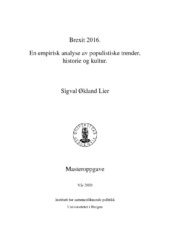Brexit 2016. En empirisk analyse av populistiske trender, historie og kultur.
Master thesis
Permanent lenke
https://hdl.handle.net/1956/23897Utgivelsesdato
2020-08-28Metadata
Vis full innførselSamlinger
- Master theses [113]
Sammendrag
Background and objectives: In June of 2016 a small majority in the United Kingdom (UK) voted to leave the European Union (EU). This is referred to as Brexit. The purpose of this thesis is to attempt to understand Brexit in terms of populist trends and characteristics of the UK’s history and culture. This is relevant in trying to understand how Brexit will affect the future of the EU and the unity between the remaining member countries. Theory and methods: The theoretical foundation for this thesis is based on a review of literature concerning populism, EU skepticism and the history of the EU and the UK. The empirical foundation is based on datasets from two data sources: European Social Survey (ESS) and British Election Study (BES). The datasets from ESS are used to perform descriptive statistics on EU skepticism in all member countries that have responded to the ESS survey over a decade (2008-2018), as well as being the foundation for a linear regression analysis with EU skepticism as the dependent variable and characteristics of populism as independent variables in five member countries. The datasets from BES are used to compare the group that said they would vote yes/ those who did vote yes with the group that said they would vote no/ those who did vote no to leave the EU on their responses on questions about populist attitudes, national identity and how the EU influences British sovereignty. A logistic regression analysis is performed with characteristics of populism, a sense of national identity and the view of how the EU influence British identity and sovereignty as independent variables and if they will vote yes or no in a referendum as the outcome variable. Results: The analysis in this thesis show that residents of the UK have a stronger degree of skepticism towards the EU than residents of other member countries, when compared over a decade. The view of whether the EU undermines British identity had a greater effect on predicting whether one was in the group that said they would vote to leave the EU than trust in politicians, trust in the elite versus ordinary people and attitudes towards immigration. Conclusions: Findings in this thesis support previous research that shows that EU skepticism has a unique position among residents of the UK, and that it is stronger than when you compare it with skepticism towards the EU among residents of other member countries. One concludes that the unity between the remaining member countries is not necessarily threatened by the withdrawal of the UK.
